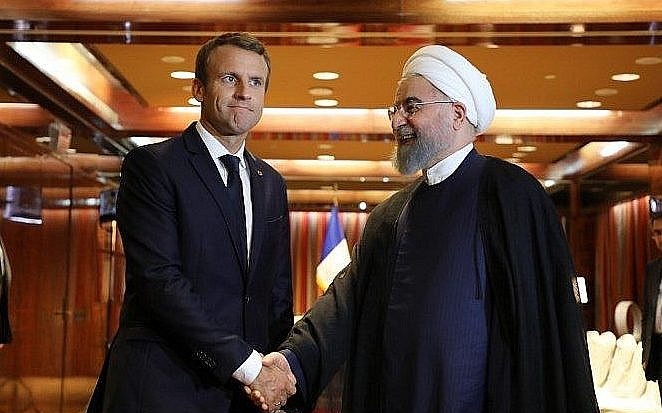French President Emmanuel Macron (L) and Iranian counterpart Hassan Rouhani, New York, September 19, 2017 (Ludovic Marin/AFP)
In a letter to French leader Emmanuel Macron, Iran’s President Hassan Rouhani has offered a de-escalation of US-Iranian conflict through a revision of the 2015 nuclear deal.
Quoting an “informed source”, Iran’s conservative site Alef said Deputy Foreign Minister Abbas Araqchi, in Paris for talks, conveyed the message to Macron.
Rouhani’s “alternative solution” says the US does not have to return to the nuclear agreement, from which the Trump Administration withdrew in May 2018. But the US must ease the comprehensive sanctions, including on Iran’s oil and financial sectors, which it imposed last November and tightened this spring.
In return, Iran will stop the suspension of its commitments to the deal, including the breaking of the limit on 3.67% enrichment of uranium.
See Iran Daily, July 7: Tehran Breaks Nuclear Deal’s Limit of 3.67% Uranium
Demonstrating caution and possible tension within the Iranian regime over the offer, Iran’s English-language sites do not refer to the detail of the Rouhani letter.
Fars, linked to the Revolutionary Guards, headlines, “Iran Stresses Adherence to Diplomacy to Restore Global Peace”. The site says Araqchi and Macron “discussed expanding bilateral ties and mutual cooperation” and “ways to save the Joint Comprehensive Plan of Action” between Iran and the 5+1 Powers (France, US, UK, Germany, China, and Russia).
Last week, Macron pursued mediation through phone calls with Rouhani and Donald Trump and the despatch of his envoy Emmanuel Bonne to Tehran.
Rouhani followed up on Thursday with a call to Macron that the Europeans must protect Tehran with a vital link to bypass American sanctions: “Europe must expedite its attempts to meet Iran’s legitimate interests and bring about truce in the US economic warfare.”
Meanwhile, Foreign Minister Mohammad Javad Zarif said in New York that Iran would accept enhanced inspections of its nuclear program, in return for the permanent lifting of the US sanctions.
See Iran Daily, July 19: Foreign Minister Zarif Offers Revised Nuclear Deal
But hours later, the Revolutionary Guards detained a UK-flagged tanker in the Strait of Hormuz, in retaliation for Britain’s impoundment of an Iranian supertanker for violation of European Union sanctions on oil to Syria’s Assad regime.
The operation — following the Supreme Leader’s promise to respond to “UK piracy” appeared to check the diplomatic process with France and Europe, but Araqchi traveled to Paris this week and met French Foreign Minister Jean-Yves Le Drian.
Rouhani With or Against Revolutionary Guards?
Rouhani’s offer revived the question of whether he and Foreign Minister Zarif are trying to prevent the Revolutionary Guards from taking over Iranian policy and tactics, or whether they are playing “good cop” to the military’s “bad cop” approach.
Rouhani said on Wednesday, “If European countries stop wrong measures such as detaining an Iranian oil tanker at Gibraltar, they will see an appropriate response from Tehran.”
At the same time, the Supreme Leader’s chief of staff said London sent a mediator to Iran to secure the release of the Swedish-owned Stena Impero tanker.
The UK Government denied the claim.
At yesterday’s Cabinet meeting, Rouhani closed any gap with the Guards by repeating that Tehran and other countries along the Persian Gulf are responsibility for security and it is none of the business of other countries:
We will not allow anyone to try to disrupt order in the Persian Gulf and the Strait of Hormuz.
It is Iran and the other littoral states, which are chiefly responsible for securing the Persian Gulf and the Strait of Hormuz, and the issue has nothing to do with others.
The Iranian nation has always acted as the guardian of the Persian Gulf
Meanwhile, the Supreme Leader’s military advisor, Brig. Gen. Hossein Dehqan, shook his fist at the United Arab Emirates and the US: “Abu Dhabi has turned into an American center to harm our national security….All US military bases and forces in the region would be targeted, if Washington took the decision to go to war.”


“In return, Iran will stop the suspension of its commitments to the deal, including the breaking of the limit on 3.67% enrichment of uranium.”
What am I missing, this is the offer?
Yep….